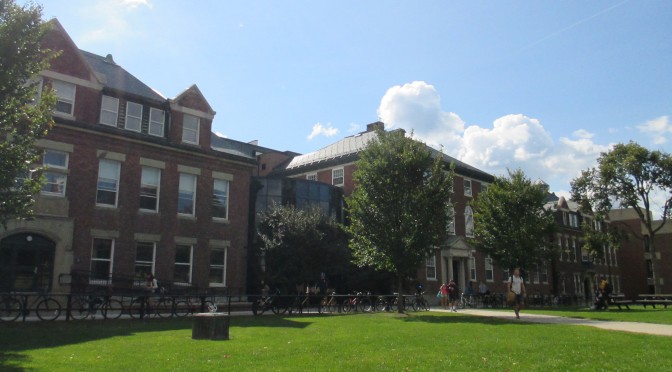5 Things Williams Pre-med Students Should Know
By Meagan Goldman ’16
“Pre-med” is a loaded term at Williams. It comes with tough classes, stress about maintaining a high GPA, and more stress about getting into med school. Countless freshmen start off on the pre-med track but decide it’s not for them. At the same time, those who do go to med school often find a deep passion for their work. I decided to speak with four pre-med seniors with very different stories – Chanel Zhan, Tendai Chisowa, Lacey Serletti, and Katie Westervelt – to figure out what they think about pre-med at Williams and what advice they’d give to younger students. Here’s what I learned.
- There is no right path. There are straight paths to med school and more winding paths. It’s great to have the self-knowledge as a freshman, like Tendai, that you want to be a doctor and strictly follow the pre-med path. But it’s also important to be sure that’s what you want to do. Don’t rush into the decision. Don’t make the decision because it’s what your parents want. Make it because you’re certain it’s what you want. For example, Chanel realized she loved what doctors do on a daily basis during the summer after freshman year, when she shadowed a doctor at a hospital and interned with a private practice physician. Katie realized that med school opens up a wide variety of jobs, from surgeons to radiologists to executives at biotech companies. Sometimes these realizations come later. If they happen after junior year, like Lacey’s did, you can always take a summer class or a class after graduation to finish your credits, and that’s okay.
- “Give yourself permission to explore the liberal arts curriculum,” says Lacey. You could be at a STEM-oriented institution, but you chose Williams. You should get the most you can out of your time here. Take non pre-med science classes; they’ll enrich your understanding of your other science classes. Take plenty of Division 1 and Division 2 classes. As Tendai points out, reading, writing, and discussion skills are important for any career. Plus, med schools want well-rounded students, and those skills will help you on the MCAT.
- “Williams gives you what you put into it,” says Chanel. You have to put in the time and effort, but support and opportunities are at your fingertips. Reach out to your professors, and they will give you help and advice – on your classes, your internships, your future plans. The relationships you develop with faculty and staff are as important as those you develop with students. Contact alumni through the alumni network, and they will gladly give you insight into their careers. Talk to as many alumni as possible to learn about their jobs. Both alumni and professors have been in positions similar to yours, and their advice is invaluable.
- Work in a lab and don’t restrict yourself to specific pre-med internships. Okay, maybe this is two pieces of advice in one. Any lab work – be it at Williams or in the summer – will help you figure out what you like and dislike. The type of lab work, what you do on a daily basis, and the area of study are all important to consider. Katie, who works with flies at Williams and does constant dissections, realized she likes using her hands. This realization contributed to her decision to go to med school. As for the summer, there are limited pre-med focused internships. Regular research internships are just as valuable. “Summer is a great chance to branch out and do research that you can’t do at Williams,” says Tendai.
- Stop comparing yourself to your classmates. We’ve all heard of the myth of effortless perfection, and we need to realize that it’s really that – a myth. Pre-med is hard. It’s competitive. There’s a lot of pressure. But those students who seem like they’re masters in the lab, like they have their futures planned out and internship lined up, are not effortlessly perfect either. I know; I’ve talked to them. Don’t lament that you’re not as qualified or talented as others. Rather, be proud of your achievements, no matter how small, and celebrate your successes.
Photo: science quad. By Elizabeth Jacobsen ’16.
